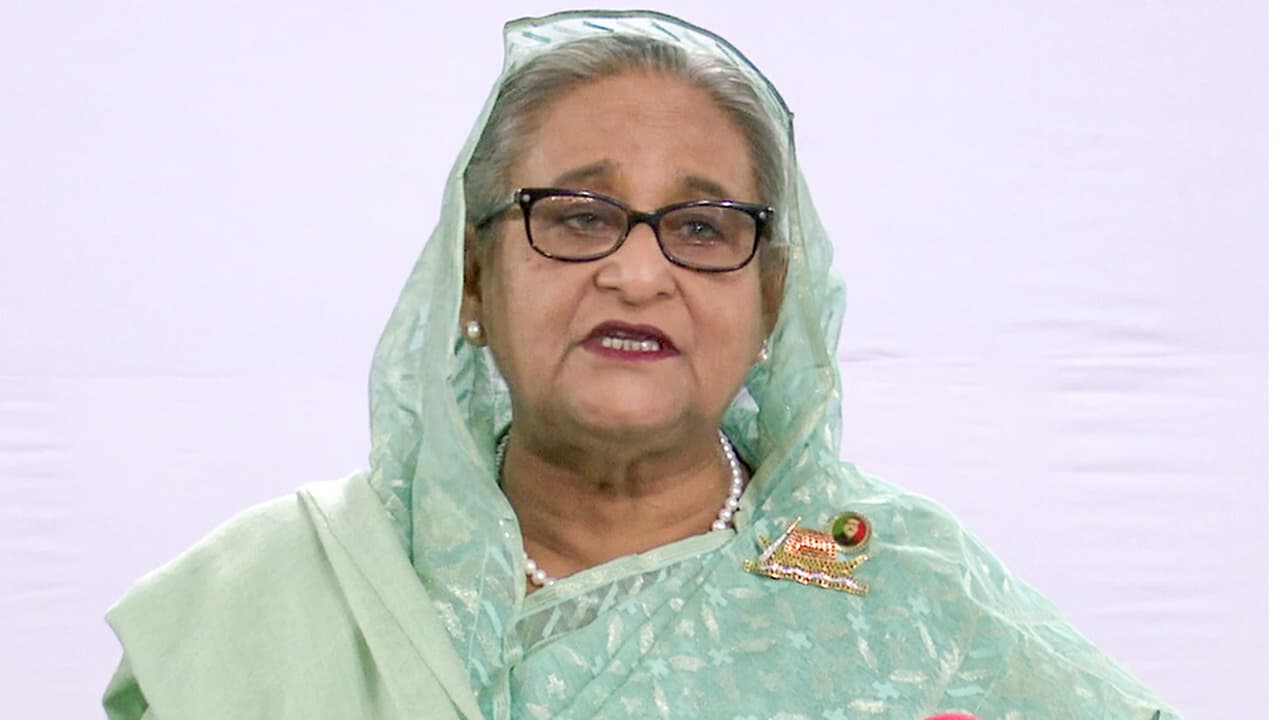Bangladesh’s Yunus govt has asked India to immediately hand over Ex-PM Sheikh Hasina and former minister Kamal after a Bangladeshi court issued a death sentence against Hasina.
After Bangladesh’s International Crimes Tribunal (ICT-BD) awarded the death sentence to former Prime Minister Sheikh Hasina and ex-interior minister Asaduzzaman Khan Kamal, the country’s interim government, led by Chief Adviser Muhammad Yunus, asked the Indian Government to hand over the ousted leaders as part of extradition treaty between New Delhi and Dhaka.
According to Bangladesh’s Ministry of Foreign Affairs, India is legally obliged to hand them over under an existing extradition treaty. Hasina fled Bangladesh in August 2024 and has been living in exile in New Delhi since then.
Bangladesh said giving shelter to them would be “unfriendly” and “contempt,” citing treaty obligations, reminding New Delhi of the existing India – Bangladesh extradition agreement.
In a press release on November 17, 2025, the ministry said the verdict by Bangladesh’s International Crimes Tribunal held Hasina and Kamal accountable for “crimes against humanity” tied to July’s killings. The statement warned that providing them safe haven would be seen in Dhaka as “an extremely unfriendly act and a disregard for justice.”
Scroll to load tweet…
Sheikh Hasina’s reaction to death sentence
Ex-PM Sheikh Hasina responded to the verdict made against her, calling the decision made by a rigged tribunal established and presided over by an unelected government with no democratic mandate. In a statement of Hasina shared by the Bangladesh Awami league, responding to the verdict, she said, “The verdicts announced against me have been made by a rigged tribunal established and presided over by an unelected government with no democratic mandate. They are biased and politically motivated. In their distasteful call for the death penalty, they reveal the brazen and murderous intent of extremist figures within the interim government to remove Bangladesh’s last elected prime minister, and to nullify the Awami League as a political force. ”
She slammed the administration of Yunus and said, “Millions of Bangladeshis toiling under the chaotic, violent and socially-regressive administration of Dr Mohammad Yunus will not be fooled by this attempt to short-change them of their democratic rights. They can see that the trials conducted by the so-called International Crimes Tribunal (ICT) were never intended to achieve justice or provide any genuine insight into the events of July and August 2025. Rather, their purpose was to scapegoat the Awami League and to distract the world’s attention from the failings of Dr Yunus and his ministers.”
Hasina further added, “Under his aegis, public services have fallen apart. Police have retreated from the country’s crime-ridden streets and judicial fairness has been subverted, with attacks on Awami League adherents going unpunished. Hindus and other religious minorities are assaulted, and women’s rights suppressed. Islamic extremists inside the administration, including figures from Hizb-ut-Tahrir, seek to undermine Bangladesh’s long tradition of secular government. Journalists are locked up and menaced, economic growth has stalled, and Yunus has delayed elections and then banned the country’s most longstanding party (the Awami League) from participating in those elections.”
What MEA said on Sheikh Hasina verdict
The Ministry of External Affairs (MEA) said, “India has noted the verdict announced by the “International Crimes Tribunal of Bangladesh” concerning former Prime Minister Sheikh Hasina. As a close neighbour, India remains committed to the best interests of the people of Bangladesh, including in peace, democracy, inclusion and stability in that country. We will always engage constructively with all stakeholders to that end.”
What should India do?
Anil Trigunayat, former Indian diplomat and distinguished fellow at the Vivekananda International Foundation (VIF), told Asianet Newsable English’s Anish Kumar that India must remain cautious: “This is for Bangladeshi people and system to take care of it. India is hoping that there would be a normal transition from current transitional authority to a properly elected democratic government.”
He added that any long-term resolution must come from Bangladesh’s internal democratic processes:
“That should have taken a decision whatever they are doing. That will have more mobility. Let’s see how it plays out. India wants well for Bangladeshi people and the country to be stabilise and have a democratic government.”
“This verdict doesn’t affect extradition” — Gautam Lahiri
Gautam Lahiri, a veteran Bangladesh affairs analyst, offered a practical legal assessment to Asianet Newsable English’s Anish Kumar: the sentencing, he said, does not increase the chances of India handing Hasina over.
“I think that the International Crime Tribunal gave verdict against Sheikh Hasina of death penalty but it will have no impact on her extradition demand because India and Bangladesh have extradition treaty which says if a person is given death penalty or he or she be killed or likely to be killed then there is no chance of handing her over to them.”
He also underscored a key technical point: “India is not a signatory to the International Crime Tribunal so that’s why India doesn’t recognise any verdict or so of ICT.”
For Hasina, this makes India one of the few places she can remain relatively insulated from immediate legal consequences.
